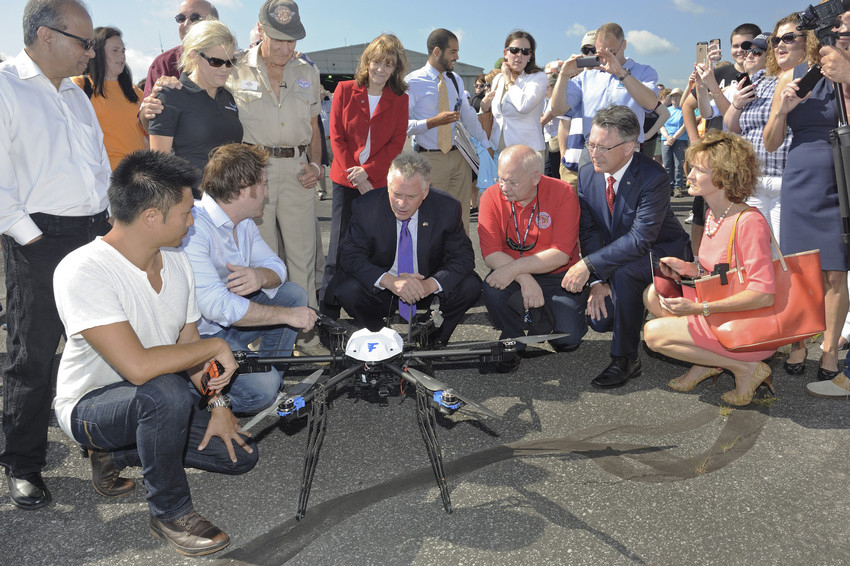Gov. Terry McAuliffe, President Timothy D. Sands observe unmanned aircraft transport medications at research flights

Industry and government partners today joined forces to use unmanned aircraft systems, commonly known as drones, to deliver medical supplies to a health clinic in Wise, Virginia. The Mid-Atlantic Aviation Partnership led by Virginia Tech oversaw the groundbreaking research flights.
“Unmanned aerial systems are an emerging technology that can make people’s lives better and contribute to our efforts to build a new Virginia economy,” said Gov. Terry McAuliffe. “Today we witnessed historic flights that demonstrate the potential for unmanned aircraft to provide essential services to citizens in remote locations in Virginia and across the globe. Virginia is once again paving a path to the future.”
McAuliffe, Virginia Tech President Timothy D. Sands, local officials, and health care providers were on hand to observe the testing of unmanned aircraft. Researchers were investigating the aircraft for the delivery of pharmaceuticals and other medical supplies in rural areas, where transportation challenges often get in the way of health care.
“Moving this technology safely into the nation’s skies has tremendous potential to help people and create new economic opportunities,” Sands said. “The unmanned systems test site program at Virginia Tech supports our mission to create knowledge that will benefit the Commonwealth and meet the needs of our changing world.”
More than a dozen community, industry, and government partners, including Flirtey Inc., an Australian unmanned systems startup company, and NASA’s Langley Research Center, teamed up to execute the deliveries using unmanned aircraft.
The aircraft ranged from a small hexacopter weighing no more than 10 pounds to NASA’s SR-22, a remotely operated aircraft with a pilot on board. Only one aircraft flew at a time in the designated airspace. In all, the flights covered more than 40 miles.
“The assets available in Virginia provide tremendous opportunities for industry leaders to work with the top experts in unmanned autonomous technologies,” Secretary of Technology Karen R. Jackson said.
The large fixed-wing aircraft remotely operated by NASA Langley Research Center personnel, with a pilot on board, transported the medical cargo to Lonesome Pine Airport in Wise.
At the airport, the medications were transferred to aircraft operated by Flirtey. The small hexacopter made several runs between the airport and the final destination, a clinic operated by the Health Wagon, a health care outreach organization, and Remote Area Medical, an international nonprofit humanitarian group.
The clinic provides free medical, dental, and vision services to more than 1,500 patients every year. Over several hours, 24 packages of medication were transported.
“We hope to be able to extend this type of activity,” said Rose Mooney, the executive director of the Mid-Atlantic Aviation Partnership, which is headquartered at the Institute for Critical Technology and Applied Science at Virginia Tech. “This was a very controlled research environment today, and of course there are many logistical and safety concerns that would need to be resolved before these deliveries could become routine. But today's flights show the capabilities of this technology and its value to the public.”
Other partners for the event include the Appalachian College of Pharmacy, Rx Partnership, SEESPAN Aerial Interactive Media, and Wise County Economic Development.

Aircraft inspection
Gov. Terry McAuliffe (third from left) and Virginia Tech President Timothy D. Sands (fifth from left) inspect a Flirtey hexacopter before its flight carrying medicines from the Lonesome Pine Airport to the Wise County Fairgrounds on Friday, July 17, 2015. Researchers were investigating the potential of unmanned aircraft for the delivery of pharmaceuticals and medical supplies in rural areas. Flirtey co-founders (from left) Tom Bass and Matt Sweeney, McAuliffe, Wise County Clerk of Circuit Court Jack Kennedy, Sands, and Virginia Secretary of Technology Karen Jackson witnessed the groundbreaking flights.







